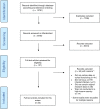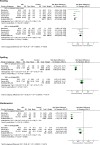School functioning of children with perinatal HIV-infection in high-income countries: A systematic review
- PMID: 34086807
- PMCID: PMC8177442
- DOI: 10.1371/journal.pone.0252746
School functioning of children with perinatal HIV-infection in high-income countries: A systematic review
Abstract
Introduction: Since the introduction of combination antiretroviral therapy, human immunodeficiency virus (HIV) infection is a manageable chronic disease. However, school-age children (4-18 years) living with HIV could still experience problems with functioning at school, due to the impact of the virus itself, medication, comorbidities and social stigma. School functioning covers academic achievement, school attendance, and social relationships and is of utmost importance to optimize normal participation.
Methods: To gain insight in school functioning problems of perinatally HIV-infected children, we performed a systematic review of the literature in multiple databases from January 1997 up to February 2019. Studies were included if they described outcomes of school functioning of school-age children perinatally infected with HIV, in high-income countries. Meta-analyses were performed for sufficiently comparable studies.
Results and discussion: Results from 32 studies show that HIV-infected children experience more problems in various areas of school functioning in comparison with national norms, matched healthy controls, siblings and HIV-exposed uninfected (HEU) children. The most pronounced differences concerned the usage of special educational services, general learning problems, and mathematics and reading performance scores. Comparisons with both national norms and siblings/HEU children show that the differences between HIV-infected children and siblings/HEU children were less pronounced. Moreover, siblings/HEU children also reported significantly worse outcomes compared to national norms. This suggests that problems in school functioning cannot be solely attributed to the HIV-infection, but that multiple socio-economic and cultural factors may play a role herein.
Conclusion: Perinatally HIV-infected children seem vulnerable to problems in various areas of school functioning. Therefore, monitoring of school functioning should be an important aspect in the care for these children. A family-focused approach with special attention to a child's socio-environmental context and additional attention for siblings and HEU children, is therefore recommended.
Conflict of interest statement
The authors have declared that no competing interests exist.
Figures




Similar articles
-
Neuropsychological and Psychosocial Functioning of Children with Perinatal HIV-Infection in The Netherlands.Viruses. 2021 Sep 28;13(10):1947. doi: 10.3390/v13101947. Viruses. 2021. PMID: 34696375 Free PMC article.
-
African Multi-Site 2-Year Neuropsychological Study of School-Age Children Perinatally Infected, Exposed, and Unexposed to Human Immunodeficiency Virus.Clin Infect Dis. 2020 Oct 23;71(7):e105-e114. doi: 10.1093/cid/ciz1088. Clin Infect Dis. 2020. PMID: 31848582 Free PMC article.
-
The impact of health programmes to prevent vertical transmission of HIV. Advances, emerging health challenges and research priorities for children exposed to or living with HIV: Perspectives from South Africa.S Afr Med J. 2019 Dec 5;109(11b):77-82. doi: 10.7196/SAMJ.2019.v109i11b.14292. S Afr Med J. 2019. PMID: 32252873
-
Health and survival of HIV perinatally exposed but uninfected children born to HIV-infected mothers.Curr Opin HIV AIDS. 2016 Sep;11(5):465-476. doi: 10.1097/COH.0000000000000300. Curr Opin HIV AIDS. 2016. PMID: 27716731 Review.
-
Psychiatric disorders in perinatally HIV-exposed, uninfected children: a systematic review.AIDS Care. 2024 Jan;36(1):70-79. doi: 10.1080/09540121.2022.2141185. Epub 2022 Nov 3. AIDS Care. 2024. PMID: 36328977
Cited by
-
A systematic review of school functioning in pediatric patients with Hirschsprung disease.Pediatr Surg Int. 2025 Apr 23;41(1):123. doi: 10.1007/s00383-025-06012-y. Pediatr Surg Int. 2025. PMID: 40266337
-
Neuropsychological and Psychosocial Functioning of Children with Perinatal HIV-Infection in The Netherlands.Viruses. 2021 Sep 28;13(10):1947. doi: 10.3390/v13101947. Viruses. 2021. PMID: 34696375 Free PMC article.
-
Are Family Factors Differentially Associated with Externalizing Symptoms Among Youth with Perinatally Acquired HIV?Child Psychiatry Hum Dev. 2024 Jan 23. doi: 10.1007/s10578-023-01651-5. Online ahead of print. Child Psychiatry Hum Dev. 2024. PMID: 38261149
-
Prevalence of depressive symptoms in adolescents living with HIV in Johannesburg, South Africa.S Afr J Psychiatr. 2024 Nov 12;30:2208. doi: 10.4102/sajpsychiatry.v30i0.2208. eCollection 2024. S Afr J Psychiatr. 2024. PMID: 39650200 Free PMC article.
-
Motivation levels and white matter microstructure in children living with HIV.Sci Rep. 2024 Feb 23;14(1):4425. doi: 10.1038/s41598-024-54411-3. Sci Rep. 2024. PMID: 38396081 Free PMC article.
References
Publication types
MeSH terms
LinkOut - more resources
Full Text Sources
Medical

